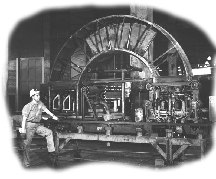 |
 |
 |
| Since its inception, the Y-12 National Security Complex
has been a leader in rapid prototyping. Built as part of the Manhattan
Project, Y-12's original mission was to construct and operate
huge calutrons—electromagnetic devices for enriching uranium for atomic
weapons.
The Y-12 calutrons were based on the calutron, or California University Cyclotron, developed by Dr. E. O. Lawrence. However, the Y-12 production calutrons needed to be far larger, with massive "racetracks" 122 ft long, 77 ft wide, and 15 ft high. Where Lawrence's University of California calutron used a 37-in. magnet, Oak Ridge's specifications called for 184-in. magnets. Because of the urgency of the wartime effort, there was no time to build a full-scale pilot plant. Out of necessity, Y-12 became the world's first full-scale calutron prototype center, pilot plant, and production plant. Construction began in February 1943. Teams from government and industry rapidly constructed buildings, built high-voltage electrical equipment, fabricated huge magnetic coils, manufactured ion sources and uranium-235 collectors, and produced hundreds of precision vacuum valves. Production began in November of that same year. Today, after more than 50 years of successful precision manufacturing for national defense, Y-12 continues to work with some of the most respected names in technology and manufacturing to produce high-risk, functional prototypes. |
|
In recognition
of the Y-12 National Security Complex's diverse, integrated capabilities and its
commitment
For information,
phone 1-800-356-4USA or visit our web site: http://orcmt.oakridge.org/npc.html
|